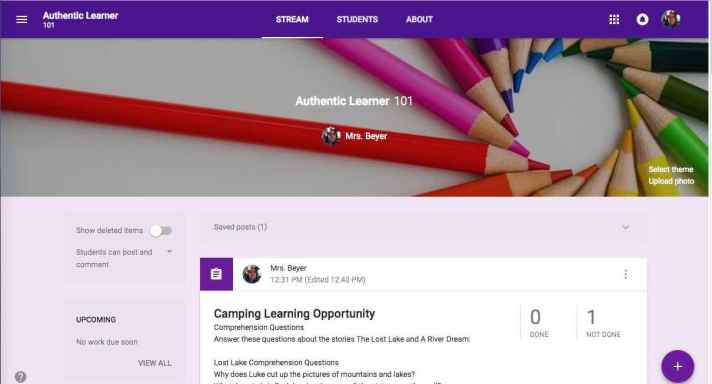If you would like to complete the 2018 Summer Learning Opportunity with Mrs. Beyer please sign up here and you will be invited to the Authentic Learner google classroom.
Summer Learning Opportunity
We will be reading The Lost Lake and A River Dream by Allen Say but I always think it is important to have some non-fiction to go along with any unit.
Making Predictions – Partner Talk
A River Dream
I found this awesome Camping for Kids book at my library. If you want to do the camping unit at home you can see if this book is available at your library, find your own camping books at your library, order it from amazon by clicking on the link (and supporting our site) or just complete the lessons.
Comprehension Questions
Answer these questions about the stories The Lost Lake and A River Dream:
Lost Lake Comprehension Questions
- Why does Luke cut up the pictures of mountains and lakes?
- What does Luke’s Dad do when he sees all the pictures on the wall?
- Why does Luke’s Dad want to take Luke to the Lost Lake?
- What happens when they arrive at the Lost Lake?
- Where do Luke and his Dad end up camping?
River Dream Comprehension Questions
- What is wrong with Mark in the beginning of the story?
- What happens to Mark after he finds the box of flies?
- What kind of fish does Mark’s Uncle catch?
- Why doesn’t Mark’s Uncle kill the fish?
- Why does Mark want to take his fish home?
Answer the questions in complete sentences. You can answer them orally or write them out. Use your answers to write your summaries on days two and three.
Here is a phonics Quick Erase lesson for the Lost Lake
Camping Day!
Camping Day is a challenging read for many elementary students even though it looks like it’s written for a pre-schooler. To follow along with the Montana Bear School Bears as they partner read watch the video below. Make sure you do the pre-reading word work too!

Camping For Kids A Family Camping Guide
I can’t encourage you enough to read with your children, discuss their likes and differences, use your public library, and most of all have fun. If you would like to write about your camping trip that would be awesome too! It can be a real story or a made up adventure.
Some other awesome camping books I like include:
S is for S’mores A Camping Alphabet
National Parks of the USA
Curious George Goes Camping
These are the Spelling and Vocabulary words we will be studying with this unit:
Vocabulary Words
- canoeing
- compass
- glum
- lonesome
- muttered
- wondered
Spelling Words
Lower Elementary Students Words
- lake
- bake
- make
- take
- snake
- camp
- frog
- hike
- stars
- tent
Upper Elementary
- amazed
- caught
- chopping
- climbing
- doing
- drifted
- flitting
- flushed
- gaping
- gasping
- gleaming
- jumped
- leaping
- splashing
- swinging
- talked
- twisting
- walked
- wanted
- whipped
Spelling Assignments:
Day One. Write your words down on a paper. Then have someone give you a pretest. Note how many you have to study.
Day Two: Phonics Work
This lesson is designed for students at the end of first grade. If you are working on Teaching Your Child To Read Words and Sentences in 100 Easy Lessons with us your child would have to be past lesson 60 to complete this practice.
Lower Elementary: Underline the vowel sounds in each word, then practice sounding them out. Complete the quick erase lesson on a white board or on paper.
Upper Elementary: Quick Erase lesson for reading and writing
Day Three: Complete the Quick Erase Lesson for the word LAKE which would come after lesson 60 in Teach Your Child To Read in 100 Lessons.
Practice spelling the words out loud and then try to write them on the paper correctly without looking. Check each word to make sure you wrote it correct before moving on to the next.
Day Four: Take a practice test and write any words you get incorrect 3-5 times.
Day Five: Take your final assessment.
CCSS.ELA-LITERACY.RL.3.1
Ask and answer questions to demonstrate understanding of a text, referring explicitly to the text as the basis for the answers.
Writing Assignments –
Day One: Power Write.
Set the timer for five minutes. Write as many words or thoughts as you possible can without worrying about the word Camping.
Day Two: Summarize
Write a summary about the story the The Lost Lake Include details about the characters, settings, and plot.
Day Three: Summarize
Write a summary about the story the A River Dream. Include details about the characters, settings, and plot.
Key Ideas and Details:
Recount stories, including fables, folktales, and myths from diverse cultures; determine the central message, lesson, or moral and explain how it is conveyed through key details in the text.
Describe characters in a story (e.g., their traits, motivations, or feelings) and explain how their actions contribute to the sequence of events
Day Four: Compare and contrast
So, the writing assignment is to compare the two stories The Lost Lake and A River Dream What’s the same in the stories and what is different. Include the point of view of each story, the genre, and give one example of what is similar in each story and one thing that is different.
CCSS.ELA-LITERACY.RL.2.6
Acknowledge differences in the points of view of characters, including by speaking in a different voice for each character when reading dialogue aloud.
CCSS.ELA-LITERACY.RL.2.9
Compare and contrast two or more versions of the same story (e.g., Cinderella stories) by different authors or from different cultures.
CCSS.ELA-LITERACY.RL.3.9
Compare and contrast the themes, settings, and plots of stories written by the same author about the same or similar characters (e.g., in books from a series)
CCSS.ELA-LITERACY.RL.4.6
Compare and contrast the point of view from which different stories are narrated, including the difference between first- and third-person narrations.
Integration of Knowledge and Ideas:
Explain how specific aspects of a text’s illustrations contribute to what is conveyed by the words in a story (e.g., create mood, emphasize aspects of a character or setting)
Day Five: Original Work
Write an original piece about a camping trip you would take or took with your family. Who would go/went with you? Where would/did you camp? What would/did you do? How long would/did you be camp for? What would/did you eat? Where would/did you sleep? What would/did you see? Include as many details as you can.
Optional Bonus Learning Opportunity – Opinion Piece
Write a review for Allen Say’s book The Lost Lake on amazon. Follow the OREO opinion writing model.
- O. opinion
- R. reason
- E. example
- O. restate your opinion
For example, you could say:
O. I like the story the Lost Lake. R. The reason I like the book is because it is about a father and son who go on a back country camping adventure and I would like to go on a backcountry camping adventure with my dad. E. An example from the story would include something like: the father used to go camping at a lake with his dad and he wants to take his son there, but when they get there the lake is crowded with people. The father and son get to know more about each other on the trip. The illustrations match the story and make you want to go to a beautiful lake like the boy and his dad which is another reason I like the story. I think you will like this book too.
Win a Prize
If you would like to enter to win a prize, all you have to do is write Allen Say a 5 star review on amazon and send a copy of your review to me at awesomemontana@gmail.com
Write opinion pieces on topics or texts, supporting a point of view with reasons.
Introduce the topic or text they are writing about, state an opinion, and create an organizational structure that lists reasons.
Provide reasons that support the opinion.
Use linking words and phrases (e.g., because, therefore, since, for example) to connect opinion and reasons.
Provide a concluding statement or section.
I am a participant in the Amazon Services LLC Associates Program, an affiliate advertising program designed to provide a means for sites to earn advertising fees by advertising and linking to amazon.com
Join the Google Classroom today to start completing Learning Opportunities!







